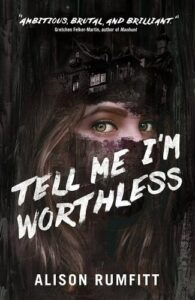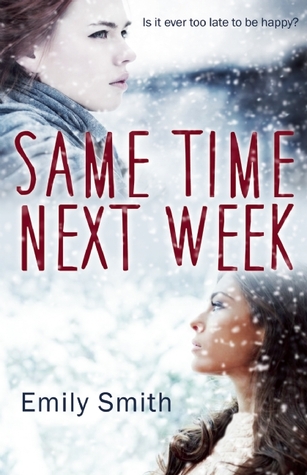Buy this from Bookshop.org to support local bookstores and the Lesbrary!
I feel so conflicted about Tell Me I’m Worthless, because it’s one the most thought-provoking and memorable horror books I’ve ever read. The sections I liked were captivating, and in the first chapter, this felt like a new favourite book. But there were also sections of this book I found unreadable.
I have to start by saying that this comes with strong content warnings (listed at the beginning of the book), including for rape, racism, transphobia, fascism, antisemitism, eugenics, and more. These topics aren’t just included: they are the central pillar of the story, and they’re described in detail. Be prepared for that going in.
This is a haunted house story, but it’s more about two people trying to live in a society so soaked in fascism that it’s easy to absorb it unconsciously. Both these main characters are bigoted. They’re deeply flawed. And they’re also compelling.
Alice, a white trans woman, and Ila, who is Jewish and mixed race, entered a haunted house three years ago with their friend Hannah, a cis white woman. Alice and Ila had a complicated relationship with a sexual and romantic element, while Hannah was always a bit removed from the other two. They each experienced their own trauma there that night, and Ila and Alice both believe that other sexually assaulted and scarred them. Hannah never left the house. Though Alice and Ila escaped, they can’t seem to free themselves entirely of its influence, and Ila convinces Alice they have to return to get closure.
While this house drives the plot—and even gets its own point of view—most of the book takes place outside of it, following Alice and Ila separately as they live in a sort of fog, unable to process what happened to them. Ila has made being transphobic practically a full time job, regularly giving talks at different institutions. The focus on these aimless, dissatisfied main characters is common in litfic, but less so in horror. Personally, I was drawn in by it, especially paired with the distinct, often meta writing style.
That writing style is precisely my hang-up with this book. Some of the writing was so effective, like the Hill House motif, but there were several points where it descended into pages and pages of hateful stream of consciousness that did not work for me at all. For example, there would be long tangents describing a dream or pages of a nonsensical auto-translated transphobic screed. At times, I completely zoned out. I understand what it was trying to do, but it really took me out of the story.
Still, it’s hard for me to put much stock in that when overall this was such a thought-provoking and powerful read. It’s a brutal book, but it’s purposeful and effective. If you’re looking for a horror book that will challenge you and leave you thinking about it long after you finish, you need to pick this up.



